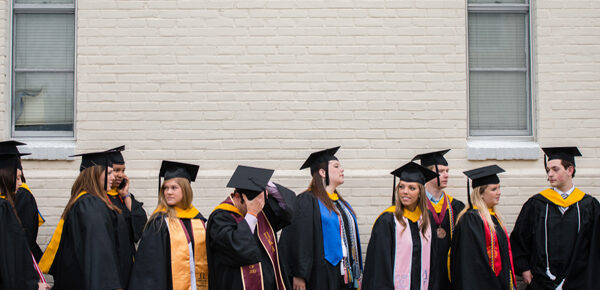DREAMers Dream Big with Out-of-State Aid
May 25, 2016
VIDEO: Access, Success, and Accountability
March 15, 2016
Bergen Community College Program Ensures All Adults Have the Opportunity to Excel
At Bergen Community College (BCC) in New Jersey, students with intellectual disabilities are able to reach college and career milestones they never thought were possible through a new program called Garden State Pathways to Independence for Students with Intellectual Disabilities Project.
December 2, 2015

Where Have All the Low-Income Students Gone?
Since 2008, an intensive national campaign has sought to boost the number of college graduates. But low-income students are now actually much less likely to enroll in college immediately after high school than they were seven years ago, despite all of the efforts to increase their post-secondary participation. ACE’s Terry Hartle and Chris Nellum discuss this surprising and deeply troubling trend.
November 25, 2015
McDaniel College Scholarship Program Aims for Diverse Workforce
Workforce diversity and postsecondary access are both key to creating a more creative and productive workforce. That’s why McDaniel College is partnering with the Howard County Public School System to create Teachers for Tomorrow, a scholarship program aimed at increasing higher education access and affordability for low-income students and developing a more diverse workforce in Howard County.
November 4, 2015
An Employee’s Path Through the New GEDWorks
October 29, 2015

Talking About Race, Class and College Access
Issues of equitable access and changing demographics weigh heavy on the shoulders of American higher education – and rightly so, write ACE’s Lorelle Espinosa and Matthew Gaertner of Pearson’s Center for College & Career Success. In this post, Espinosa and Gaertner discuss the takeaways from a recent convening on college access and success for minority and low-income students.
October 5, 2015

Supporting First-Generation and Low-Income Students at the University of Florida
First launched in 2006, the Machen Florida Opportunity Scholars Program supports nearly 1,250 undergraduates annually and will soon surpass the 2,000 alumni milestone. For the first-generation and low-income students in the program, early estimates indicate that they are 44 percent more likely to graduate in four years and 47 percent more likely to complete in six years compared to their peers.
September 21, 2015
Maricopa Community Colleges Help Foster Youth Transition to Success
September 16, 2015
VIDEO: Race, Class, and College Access
September 16, 2015